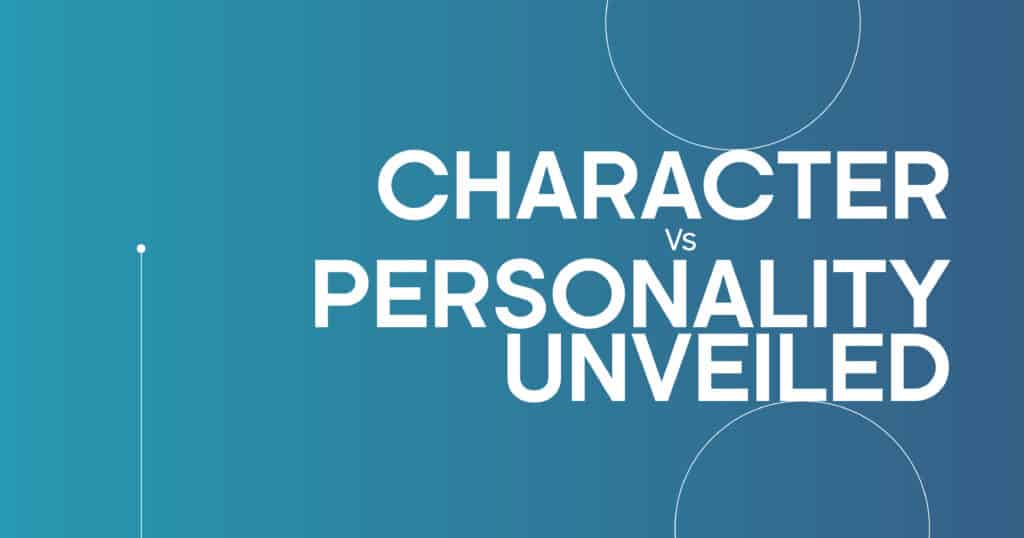When we think about people, we might throw around some words to qualify them. We say some are kind, principled, honest, or difficult. You may wonder what aspects these words speak to their character or personality.
Indeed, character and personality are different expressions of inner qualities. Perhaps this is why both terms are often confused. However, understanding the difference between character vs personality helps to reveal beautiful insights about ourselves and others. It keeps us attuned with our inner selves and helps us connect better with people around us.
In this article, we’ll highlight the thin line between character vs personality and why they matter. We’ll also explore how both can transform a person with respect to how they relate to their environment.
Defining Character: Core Attributes and Qualities
Your character traits reflect your moral compass, your core values, and beliefs. It is a test of your sense of right or wrong, principles, and integrity. And it may be tested across difficult situations. When stretched beyond our comfort zone, we tend to become more aware of our character and may use this to our advantage to overcome the ordeal.
A person’s ethical standing might take longer to puzzle out. When dealing with others, you might need a patient observation of their choices. Those series of decisions show a pattern that subtly reveals their character.
Life experiences have a significant impact on the character of a person over time. The multiple successes or failures, adversities, and challenges. While these modify our ethics, they also develop our character. This implies that your core attributes and qualities require building. It’s a reflection of the growth spurt from a conscious decision about how you want to live.
California Mental Health
Understanding Personality: Behavior and Temperament
Personality is more reflective of your behavior and temperament. It explains the traits and attributes we adopt while interacting with the outer world. Although with great influence on our character, people can make it out very easily.
Many theories explain how personality traits are formed, like genetics, experience, and a person’s environment. Some people even argue that personalities can be changed, contrary to the usual supposition about them being innate.
We describe people as introverted, extroverted, confident, pessimistic, melancholic, or lazy before even getting to know their names. This is how plain we come across to people with our personalities. Sometimes, we need more than one interaction to understand a person’s behavior. When we finally conclude, we have more than enough pointers from their disposition to make sense of their traits.
| Character | Personality |
| Consistent | Situational |
| Deep-rooted | Superficial |
| Deliberate and Reflective | Reactive |
| Evolving | Stable |
How Nature Shapes Identity and Disposition
Are we born with our identities or shaped by our immediate world? Or can both truths co-exist? Indeed, these are questions we should address. Genetics and environmental factors are important contributors to our identity, quirks, and disposition. And our identity also connotes our lived experiences and cultures.

Our genes carry the blueprints of many of our traits and behaviors. Hence, the reason why some personalities are linked to genetic inheritance. This biological composition often impacts how we develop from childhood to adulthood.
For example, research has shown intelligence increases with age, pointing to the amplifying effects of certain genes as we grow. Similarly, some tendencies may take form in adulthood.
The nature vs. nurture debate when it comes to identity in mental health is significant when discussing depression. Scientists have identified specific genes implicated in the predisposition to a depressed state.
On the other hand, environmental factors like adverse life events and exposure to stressful conditions are also role players in the development of depressive disorders.
Historically, a lot of philosophies argue about the effects of environment and nature on our development. This was the reason for various behavioral and biological theories earlier on.
However, later came the psychodynamic theories of personality with a better emphasis on both factors. When it comes to answering which influences human identity more, nature or nurture? The answer remains that everyone is a product of genetics and their lived experiences.
The Role of Temperament in Personality Traits
While we may use temperament to describe a person, it may only describe a part of their personality. It connotes an individual’s daily interactions and even how their mind works. There are four umbrella classifications of temperaments based on culture, gender, and age. They include:
| Temperament | Description |
| Sanguine | Extremely extroverted and sociable people. |
| Choleric | Dominant and assertive. |
| Phlegmatic | Laid-back or passive. |
| Melancholic | Reserved, thoughtful, and sensitive. |
Temperament references our energy, mood, and sensitivity. It’s usually innate and has a strong influence on our approach to the world. On the other hand, personality is a comprehensive concept that includes temperament.
However, it also adopts some learned beliefs, behaviors, and values. Personality traits like openness, extroversion, and conscientiousness are deductions from our temperament. Yet, they are fine-tuned by our daily experiences.
It may be a little challenging, but it’s possible to change temperament styles. Theories proposed around behavioral traits dictate they’re innate. Meanwhile, they’re shaped by childhood and familial factors. It’s also not uncommon for people to desire imbibing new attributes. For example, a reserved person may seek to be the life of the party. Attempts at changing one’s personality can also assume a similar trajectory.
California Mental Health
Attributes and Their Impact on Individual Identity
A big aspect of attributes is their recognition by an individual. It’s the various roles we fulfill in our lives that form how we perceive ourselves. At a point, specific traits are of more interest to us. This is important in self-evolution, as a behavior gives way for another to manifest.
An individual’s identity can be conferred by others. It can also be influenced by social settings, more so the way we portray ourselves in public. Our self-perception keeps changing throughout our lifetime. Establishing an identity means we’re committed to specific moral stances, beliefs, goals, actions, and values.

If you’re aware of a particular key self-attribute, your choices are more informed. You’re best suited to decide what organization to work with, for instance, based on the environment. Your occupation being a right fit for you also gives further avenues to develop other necessary attributes required to thrive in your career.
Another importance of recognizing attributes is to keep aware of our interaction style. When talking with others, we best manifest our beliefs and personal traits. Since people have different personality traits, they also assume various roles in the collective setting.
The Interplay Between Character and Behavior
Habits change into character, which is a composite of our behavior. Character is a set of traits that define who we are and has a great impact on our daily choices. Meanwhile, behavior implies our actions and impulses depending on circumstances.
Our behavior mirrors our character. Your compounded actions toward different situations over time are a good test of your character. For example, a person with character of integrity, virtue, and fortitude will choose to adopt certain good behaviors. While our tendencies demonstrate aspects of us, they invariably hint at our character.
You can imagine character as the foundation upon which a person’s behavior is built. The latter is the outward expression of these internal qualities through our actions and reactions to the outer world. Behaviors are observable and measurable, and seen as the manifestation of one’s thought process, environment, and emotions.
Connect With CA Mental Health for Guidance
Getting in touch with one’s true self involves understanding the depths of our personalities. An enhanced personal connection increases the chances of making the best of our lives. Now is the time to aim for a better connection with your inner self.
Contact CA Mental Health today for more guidance about this next exciting journey of your life!
California Mental Health
FAQs
What are the key differences in traits and attributes between character and personality?
Character focuses on the ethical and moral qualities guiding a person’s actions. A person’s personality encompasses the expressed traits of their behavior, attitudes, and emotions.
How do behavior and disposition reflect one’s unique temperament and identity?
Behavior shows a pattern in an individual’s thoughts, actions, and choices which informs how they’re perceived. But one’s temperament is innate, and it influences people’s disposition to their environment. A person’s personality is an embodiment of a set of characteristics that shape their identity.
In what ways does nature contribute to the development of personal qualities and attributes?
Our genetics and other hereditary factors impact our personality development from childhood to adulthood. Studies have shown that some attributes like temperament, emotions, and some mental health predispositions are linked to our genes.
How can understanding one’s temperament help in interpreting their personality traits?
Understanding your temperament will help you identify some behavioral inclinations and your daily interactions. You gain insights into your strengths, weaknesses, and motivations to become better self-aware.
What is the relationship between an individual’s character and the qualities that shape their personal nature?
Character involves beliefs and virtues that impact an individual’s personality. When it comes to qualities that shape our natures, life experiences reveal many intrinsic qualities over time.







